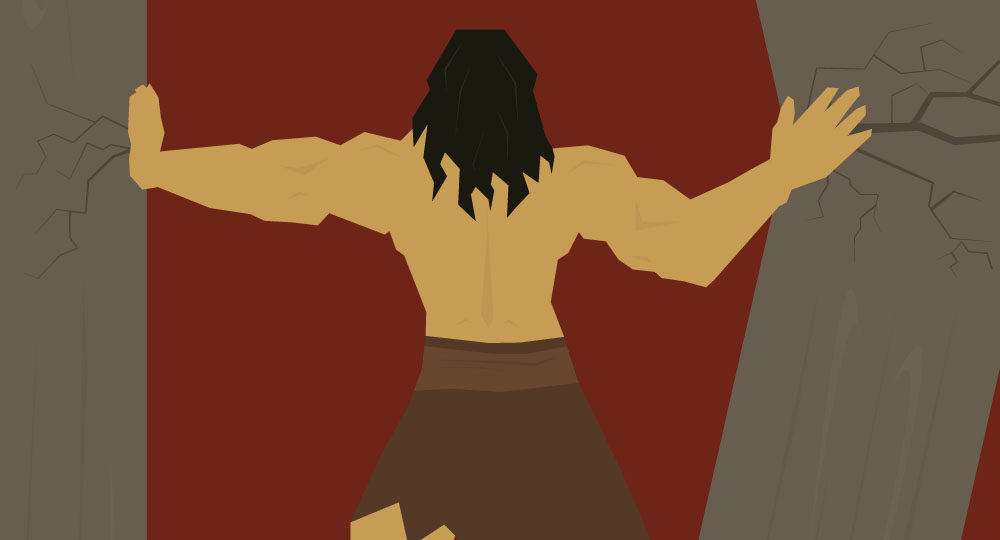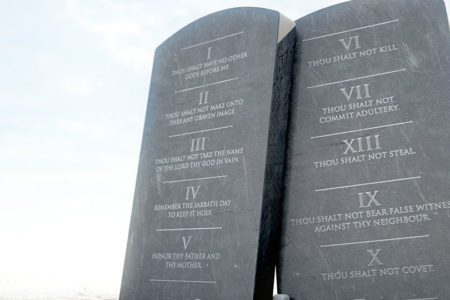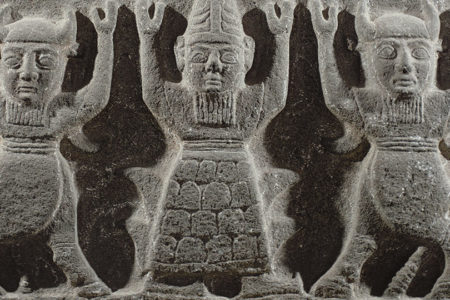The Samson Syndrome
Millions of Americans are experiencing the “Samson Syndrome.” Nearly 20 million have purchased Rick Warren’s book The Purpose-Driven Life, attesting to the fact that this generation desperately seeks purpose and meaning. People sense their potential but lack the perception and discipline to achieve it. The strongest man in the world was just such a man, and his failure was recorded that we might learn from his mistakes.
The book of Judges records the work of people whom God raised up to deliver Israel from divine chastening. They usually were ordinary individuals who defeated Israel’s oppressors after the nation repented of sin and called on the Lord. Samson alone was designated a judge before his conception.
Israel’s cycle of rebellion, repression, repentance, and restoration (through a judge) repeats throughout the book. God was always faithful to restore Israel, but each cycle produced an over-all degeneration in Israel’s spiritual condition (2:19). Each judge became less of a spiritual leader, and Samson was the last in line.
The Announcement
The prophecy of Samson’s birth was filled with promise. Childless long enough to be considered barren, his mother was visited by the Angel of Yahweh with the wonderful news that she would bear a son. She was told to abstain from wine, strong drink, and unclean food because her son was to be a lifelong Nazirite; even his prenatal existence was important to Yahweh.
The woman related the epiphany to her husband, Manoah, restating the Nazirite lifestyle expected of their promised son. dedicated to God from conception, he would “begin to deliver Israel out of the hand of the Philistines” (13:5) after 40 years of oppression.
Imagine Manoah’s shock. He begged God to resend the messenger and provide more information. So the Angel of Yahweh visited the woman again. When she fetched her husband, Manoah asked, “What will be the boy’s rule of life, and his work?” (v. 12). But Manoah was instructed to listen to everything already told his wife, especially concerning her diet. God’s Word states explicitly that this child was to be a Nazirite from womb to tomb. The couple then sacrificed to the Lord. The Messenger accepted the offer-ings and ascended in the flame, emphasizing the prophecy’s divine origin. Then Manoah feared for their lives: “We shall surely die, because we have seen God!” (v. 22). But his wife pointed out that they were safe because God had accepted their offerings and promised a deliverer. One wonders if Manoah’s spiritual density contributed to his son’s eventual failure.
One angelic visit and one statement of Samson’s destiny would have sufficed. The repetition clearly emphasized his potential. True to the angel’s words, Samson (Hebrew, Shimshon), their “sunshine,” their “ray of light,” was born.
The Early Years
The introduction (“And the Spirit of the Lᴏʀᴅ began to move upon him,” 13:25) and summary (“And he judged Israel twenty years,” 15:20) shape chapters 14 and 15 as a unit. This inclusio strikingly designates the events surrounding Samson’s marriage as a general description of his judgeship. The absence of any truly positive exploits or major deliverances of Israel from Philistine domination reinforces the portrayal of his ministry as rather ineffective. The account is a disappointing mixture of God’s supernatural enablement (strength) and Samson’s neglect of his calling.
Why did Samson disregard everything prophesied before his birth? Why did he live to satisfy himself rather than God, evidencing no sense of his destiny? Why did he manifest no apparent sense of God’s purpose in His life? The Bible mentions no unusual acts of patriotic service or interest in delivering his people. Clearly, “the Spirit of the Lᴏʀᴅ came mightily upon him” three times (14:6, 19; 15:14), revealing that supernatural strength and ability were available. But he did not use this divine enablement effectively, except for his own self-preservation or gratification.
Samson focused on satisfying his desires. Living in danite territory, he spent his leisure and sought his pleasure in the Philistine kingdom next door. He insisted on marrying a Timnite woman, rather than an Israelite as God had directed, saying, “for she pleases me well” (14:3). Incredible as it seems, this insistence was “of the Lᴏʀᴅ—that He was seeking an occasion to move against the Philistines” (14:4). God used Samson’s consorting with the Philistines as a means to implement the whole purpose of the man’s existence—to break the Philistine yoke—though Samson and his parents seemed oblivious to the fact.
At his wedding feast Samson engaged his 30 companions (secured by his in-laws) with a riddle and a wager of new clothing for each. The atmosphere changed when, unable to unravel his riddle, they angrily threatened his new bride and her family. desperate, his wife wept and begged him for the answer. Imagine the betrayal Samson must have felt when his new wife told the answer to his new “friends.” Angrily he stormed off to kill 30 Philistines to fulfill his bargain and, more likely, to assuage his grief. He then returned to his parents’ home, rather than to his new wife.
When he eventually returned to his wife’s father’s home, he was denied entry because she had been given to his “friend.” Heartbroken and angry, Samson expended what must have been an enormous amount of time and energy to catch 300 foxes, tie them in pairs by their tails, and release each pair with a burning torch into the Philistine grain fields. When the Philistines retaliated by burning his former wife and her father, Samson ruthlessly attacked them “with a great slaughter,” saying, “Since you would do a thing like this, I will surely take revenge on you, and after that I will cease” (15:7–8).
The angry Philistines mobilized against Judah and demanded Samson. Frustrated, afraid, and seeing him as a royal pain rather than a theocratic leader, 3,000 Judean men sought to bind and deliver him to the Philistines, which he allowed. After the exchange, Samson, empowered by God’s Spirit, destroyed 1,000 Philistines with a donkey’s jawbone. He bragged about his conquest and called on God because he was thirsty. Amazingly, God blessed him with a spring of water from a rock. He accomplished God’s will only in the exercise of his own selfish motives.
As a corollary to satisfying his sensual desires, Samson disdained his divinely imposed Nazirite lifestyle. Nazirites were prohibited from consuming products of the grapevine, cutting their hair, and touching anything dead (Num. 6:1–8). Nazirite, from the Hebrew verb nazir, means to “separate or consecrate,” indicating one’s total separation unto God for the duration of the vow. Samson practiced some physical aspects of his vow (he never cut his hair) but ignored the spiritual: consecration to Yahweh. His contact with the dead (lion, carcass, dead men’s clothing, jawbone, etc.) seems quite casual, and his riddle manifested his lighthearted attitude toward his separation, as did playing with the ritually unclean foxes.
Though not explicitly condemned by the law of the Nazirite, Samson’s Philistine marriage and his other relationships with women certainly belied his separation unto God. Samson consorted with the Philistine community rather than fighting against it and acted mostly on the impulses of his own selfish desires. This man was no Joshua, Samuel, Gideon, or even Jephthah. Like a mirage, Samson’s spiritual ministry dissipates under scrutiny.
The Downfall
Defeat and death occur because Samson continued to consort with those he was born to defeat. As he prostituted (literally) his separation unto the God who created him, so he prostituted the design and destiny of his life. Like a Greek tragedy, this life, so full of promise and potential, ground grimly to a sad end.
Trapped in an evening tryst in Gaza with a Philistine prostitute, Samson used his God-given strength to save himself. Rising at midnight, he uprooted the city gates, bars, and posts and carried them up the mountain. Again he walked away unscathed from open disobedience to God’s law. But no one trifles with God indefinitely.
Enter delilah. In this longer relationship, Samson’s spiritual and relational density manifested his delusion that he could live on the edge forever. delilah, a Philistine, tried to coax him into revealing the source of his strength so that the Philistines could enslave him. Scripture says, “she pestered him daily…so that his soul was vexed to death” (16:16). Ignoring the obvious warning signs, he finally told her the truth. delilah lulled him to sleep, shaved his head, and handed him over (vv. 19–20). despising his separation for the last time, Samson’s world came crashing down. The Lord “departed from him,” and he lost all his strength (v. 20). Clearly, he never saw this coming.
His Philistine masters were as merciless as sin. They gouged out his eyes, the gate of his sensual path. They took him to Gaza and bound him with bronze chains to the prison’s grinding wheel. This time there was no escape. Probably replacing an ox, he served, most menially, the people he had been born to destroy.
Yet even to those who trifle with His calling, God is often merciful. Soon the Philistines assembled to worship their god for supposedly delivering Samson to them. Exuberant in celebration and ignorant of his growing hair, they summoned Samson to their temple for amusement. Begging God for one last enablement, Samson dislodged the center support pillars and collapsed the roof, killing everyone and destroying more Philistines at his death than during his entire life.
What a testimony to ineffective living. The man whom God had gifted to remove oppression accomplished more at his death than during his 20-year judgeship. Will it be said of us that more Kingdom work was accomplished at our funerals than during our lifetimes?
The Samson Syndrome can be deadly. It is to ignore your heavenly calling by living for your sensual appetites, to despise the holiness God requires while satisfying your earthly desires, and to marginalize your Kingdom effectiveness by seeking pleasure in another kingdom.
How can you avoid the Samson Syndrome? The same way Samson could have. The key to success had been recorded for him by Moses (dt. 30:15–20) and Joshua (1:8): Love the Lord, meditate on His Word, obey Him, and serve Him. Paul said it well to the Romans (12:1–2; 13:13–14). dabbling in the world brings devastation.
On his first visit to Britain, D. L. Moody heard the words of evangelist Henry Varley: “The world has yet to see what God will do with and for and through and in and by the man who is fully consecrated to Him.” Moody responded, “I will try my utmost to be that man.” What about you?








Rick Warren for all his heresies ought to be excommunicated from the church today as he lives and works in disobedience to the Scriptures. How can an Christian individual assign him any credibility?